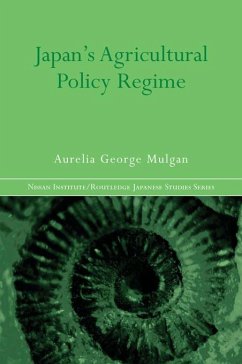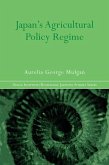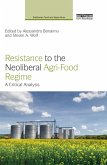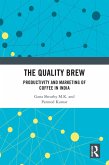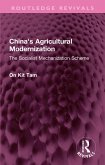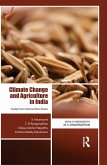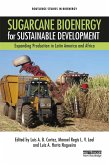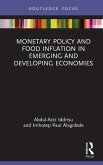Aurelia George Mulgan
Japan's Agricultural Policy Regime (eBook, ePUB)
41,95 €
41,95 €
inkl. MwSt.
Sofort per Download lieferbar

21 °P sammeln
41,95 €
Als Download kaufen

41,95 €
inkl. MwSt.
Sofort per Download lieferbar

21 °P sammeln
Jetzt verschenken
Alle Infos zum eBook verschenken
41,95 €
inkl. MwSt.
Sofort per Download lieferbar
Alle Infos zum eBook verschenken

21 °P sammeln
Aurelia George Mulgan
Japan's Agricultural Policy Regime (eBook, ePUB)
- Format: ePub
- Merkliste
- Auf die Merkliste
- Bewerten Bewerten
- Teilen
- Produkt teilen
- Produkterinnerung
- Produkterinnerung

Bitte loggen Sie sich zunächst in Ihr Kundenkonto ein oder registrieren Sie sich bei
bücher.de, um das eBook-Abo tolino select nutzen zu können.
Hier können Sie sich einloggen
Hier können Sie sich einloggen
Sie sind bereits eingeloggt. Klicken Sie auf 2. tolino select Abo, um fortzufahren.

Bitte loggen Sie sich zunächst in Ihr Kundenkonto ein oder registrieren Sie sich bei bücher.de, um das eBook-Abo tolino select nutzen zu können.
This book charts the changes in Japanese agricultural policy in the post-war period and looks at the level at which such policy is designed by the Ministry of Agriculture, Forestry and Fisheries to protect its own interventionist powers
- Geräte: eReader
- mit Kopierschutz
- eBook Hilfe
- Größe: 1.29MB
Andere Kunden interessierten sich auch für
![Japan's Agricultural Policy Regime (eBook, PDF) Japan's Agricultural Policy Regime (eBook, PDF)]() Aurelia George MulganJapan's Agricultural Policy Regime (eBook, PDF)41,95 €
Aurelia George MulganJapan's Agricultural Policy Regime (eBook, PDF)41,95 €![Resistance to the Neoliberal Agri-Food Regime (eBook, ePUB) Resistance to the Neoliberal Agri-Food Regime (eBook, ePUB)]() Resistance to the Neoliberal Agri-Food Regime (eBook, ePUB)43,95 €
Resistance to the Neoliberal Agri-Food Regime (eBook, ePUB)43,95 €![The Quality Brew (eBook, ePUB) The Quality Brew (eBook, ePUB)]() Gana Shruthy M. K.The Quality Brew (eBook, ePUB)41,95 €
Gana Shruthy M. K.The Quality Brew (eBook, ePUB)41,95 €![China's Agricultural Modernization (eBook, ePUB) China's Agricultural Modernization (eBook, ePUB)]() On Kit TamChina's Agricultural Modernization (eBook, ePUB)52,95 €
On Kit TamChina's Agricultural Modernization (eBook, ePUB)52,95 €![Climate Change and Agriculture in India (eBook, ePUB) Climate Change and Agriculture in India (eBook, ePUB)]() K. PalanisamiClimate Change and Agriculture in India (eBook, ePUB)34,95 €
K. PalanisamiClimate Change and Agriculture in India (eBook, ePUB)34,95 €![Sugarcane Bioenergy for Sustainable Development (eBook, ePUB) Sugarcane Bioenergy for Sustainable Development (eBook, ePUB)]() Sugarcane Bioenergy for Sustainable Development (eBook, ePUB)41,95 €
Sugarcane Bioenergy for Sustainable Development (eBook, ePUB)41,95 €![Monetary Policy and Food Inflation in Emerging and Developing Economies (eBook, ePUB) Monetary Policy and Food Inflation in Emerging and Developing Economies (eBook, ePUB)]() Abdul-Aziz IddrisuMonetary Policy and Food Inflation in Emerging and Developing Economies (eBook, ePUB)20,95 €
Abdul-Aziz IddrisuMonetary Policy and Food Inflation in Emerging and Developing Economies (eBook, ePUB)20,95 €-
-
-
This book charts the changes in Japanese agricultural policy in the post-war period and looks at the level at which such policy is designed by the Ministry of Agriculture, Forestry and Fisheries to protect its own interventionist powers
Dieser Download kann aus rechtlichen Gründen nur mit Rechnungsadresse in A, B, BG, CY, CZ, D, DK, EW, E, FIN, F, GR, HR, H, IRL, I, LT, L, LR, M, NL, PL, P, R, S, SLO, SK ausgeliefert werden.
Produktdetails
- Produktdetails
- Verlag: Taylor & Francis eBooks
- Seitenzahl: 256
- Erscheinungstermin: 12. November 2012
- Englisch
- ISBN-13: 9781134211852
- Artikelnr.: 38259787
- Verlag: Taylor & Francis eBooks
- Seitenzahl: 256
- Erscheinungstermin: 12. November 2012
- Englisch
- ISBN-13: 9781134211852
- Artikelnr.: 38259787
- Herstellerkennzeichnung Die Herstellerinformationen sind derzeit nicht verfügbar.
Aurelia George Mulgan is Associate Professor of Politics at the University of New South Wales, Australian Defence Force Academy, Australia. She has published widely in the area of Japanese politics and is the author of The Politics of Agriculture in Japan (Routledge, 2000), Japan's Failed Revolution: Koizumi and the politics of economic reform (2002) and Japan's Interventionist State (Routledge, 2005).
1 Introduction Bureaucratic Dependencies and Strategies of
Intervention-Maximising Maximising MAFF Intervention in the Process of
Agricultural Policy Reform 2 The Agricultural Policy Regime in Historical
Perspective Maximising Ministry Intervention within Constraints Maximising
Ministry Intervention in Historical Perspective The Agricultural Basic Law
Incremental Liberalisation of Food Control Agricultural and Rural Public
Works Conclusion 3 Agricultural Policies From the Late 1970s to the Late
1980s Antipathetic Trends in the Agricultural Policy Environment Fiscal
Pressures on the Food Control System Appreciation of the Yen The Maekawa
and Other Reports Pressures for Agricultural Trade Liberalisation The
MAFF's Policy Response Deregulating the Food Control System and Cutting
Costs De-Emphasising Price Supports and Fostering Core Farmers Embracing
Internationalisation Further Reductions in Price Support Agricultural Trade
Liberalisation Conclusion 4 Agricultural Policies from the late 1980s to
the late 1990s The MAFF's Policy Response Reforming the Food Control System
The New Policies Rejecting Rice Tariffication at the GATT The Uruguay Round
Agreement on Agriculture The URAA Countermeasures Package Agricultural
Support and Stabilisation Price Trends The New Food Law The New Rice Policy
Agricultural trade liberalisation and APEC Conclusion 5 Agricultural
Policies from the Late 1990s The MAFF's Policy Response Early Rice
Tariffication New Rice Production Control Measures Preparing for the New
Basic Law The New Basic Law Evaluating the New Basic Law Applying the New
Basic Law i) Securing Stable Supplies of Food ii) Market Determination of
Agricultural Prices iii) Direct Payments to Disadvantaged Areas v)
Agricultural Trade Policy The Basic Plan The Drive for Efficiency and
Accountability in Subsidised Works Expenditure Direct Income
Supplementation The 'Takebe Private Plan' Invoking Import Safeguards The
BSE Scandal Structural Reform Special Zones The Rice Policy Reform Outline
WTO Agricultural Trade Policy Bilateral Free Trade Agreements (FTAs) The
Entry of Ordinary Jointstock Companies into Farming The New Basic Plan
Conclusion
Intervention-Maximising Maximising MAFF Intervention in the Process of
Agricultural Policy Reform 2 The Agricultural Policy Regime in Historical
Perspective Maximising Ministry Intervention within Constraints Maximising
Ministry Intervention in Historical Perspective The Agricultural Basic Law
Incremental Liberalisation of Food Control Agricultural and Rural Public
Works Conclusion 3 Agricultural Policies From the Late 1970s to the Late
1980s Antipathetic Trends in the Agricultural Policy Environment Fiscal
Pressures on the Food Control System Appreciation of the Yen The Maekawa
and Other Reports Pressures for Agricultural Trade Liberalisation The
MAFF's Policy Response Deregulating the Food Control System and Cutting
Costs De-Emphasising Price Supports and Fostering Core Farmers Embracing
Internationalisation Further Reductions in Price Support Agricultural Trade
Liberalisation Conclusion 4 Agricultural Policies from the late 1980s to
the late 1990s The MAFF's Policy Response Reforming the Food Control System
The New Policies Rejecting Rice Tariffication at the GATT The Uruguay Round
Agreement on Agriculture The URAA Countermeasures Package Agricultural
Support and Stabilisation Price Trends The New Food Law The New Rice Policy
Agricultural trade liberalisation and APEC Conclusion 5 Agricultural
Policies from the Late 1990s The MAFF's Policy Response Early Rice
Tariffication New Rice Production Control Measures Preparing for the New
Basic Law The New Basic Law Evaluating the New Basic Law Applying the New
Basic Law i) Securing Stable Supplies of Food ii) Market Determination of
Agricultural Prices iii) Direct Payments to Disadvantaged Areas v)
Agricultural Trade Policy The Basic Plan The Drive for Efficiency and
Accountability in Subsidised Works Expenditure Direct Income
Supplementation The 'Takebe Private Plan' Invoking Import Safeguards The
BSE Scandal Structural Reform Special Zones The Rice Policy Reform Outline
WTO Agricultural Trade Policy Bilateral Free Trade Agreements (FTAs) The
Entry of Ordinary Jointstock Companies into Farming The New Basic Plan
Conclusion
1 Introduction Bureaucratic Dependencies and Strategies of
Intervention-Maximising Maximising MAFF Intervention in the Process of
Agricultural Policy Reform 2 The Agricultural Policy Regime in Historical
Perspective Maximising Ministry Intervention within Constraints Maximising
Ministry Intervention in Historical Perspective The Agricultural Basic Law
Incremental Liberalisation of Food Control Agricultural and Rural Public
Works Conclusion 3 Agricultural Policies From the Late 1970s to the Late
1980s Antipathetic Trends in the Agricultural Policy Environment Fiscal
Pressures on the Food Control System Appreciation of the Yen The Maekawa
and Other Reports Pressures for Agricultural Trade Liberalisation The
MAFF's Policy Response Deregulating the Food Control System and Cutting
Costs De-Emphasising Price Supports and Fostering Core Farmers Embracing
Internationalisation Further Reductions in Price Support Agricultural Trade
Liberalisation Conclusion 4 Agricultural Policies from the late 1980s to
the late 1990s The MAFF's Policy Response Reforming the Food Control System
The New Policies Rejecting Rice Tariffication at the GATT The Uruguay Round
Agreement on Agriculture The URAA Countermeasures Package Agricultural
Support and Stabilisation Price Trends The New Food Law The New Rice Policy
Agricultural trade liberalisation and APEC Conclusion 5 Agricultural
Policies from the Late 1990s The MAFF's Policy Response Early Rice
Tariffication New Rice Production Control Measures Preparing for the New
Basic Law The New Basic Law Evaluating the New Basic Law Applying the New
Basic Law i) Securing Stable Supplies of Food ii) Market Determination of
Agricultural Prices iii) Direct Payments to Disadvantaged Areas v)
Agricultural Trade Policy The Basic Plan The Drive for Efficiency and
Accountability in Subsidised Works Expenditure Direct Income
Supplementation The 'Takebe Private Plan' Invoking Import Safeguards The
BSE Scandal Structural Reform Special Zones The Rice Policy Reform Outline
WTO Agricultural Trade Policy Bilateral Free Trade Agreements (FTAs) The
Entry of Ordinary Jointstock Companies into Farming The New Basic Plan
Conclusion
Intervention-Maximising Maximising MAFF Intervention in the Process of
Agricultural Policy Reform 2 The Agricultural Policy Regime in Historical
Perspective Maximising Ministry Intervention within Constraints Maximising
Ministry Intervention in Historical Perspective The Agricultural Basic Law
Incremental Liberalisation of Food Control Agricultural and Rural Public
Works Conclusion 3 Agricultural Policies From the Late 1970s to the Late
1980s Antipathetic Trends in the Agricultural Policy Environment Fiscal
Pressures on the Food Control System Appreciation of the Yen The Maekawa
and Other Reports Pressures for Agricultural Trade Liberalisation The
MAFF's Policy Response Deregulating the Food Control System and Cutting
Costs De-Emphasising Price Supports and Fostering Core Farmers Embracing
Internationalisation Further Reductions in Price Support Agricultural Trade
Liberalisation Conclusion 4 Agricultural Policies from the late 1980s to
the late 1990s The MAFF's Policy Response Reforming the Food Control System
The New Policies Rejecting Rice Tariffication at the GATT The Uruguay Round
Agreement on Agriculture The URAA Countermeasures Package Agricultural
Support and Stabilisation Price Trends The New Food Law The New Rice Policy
Agricultural trade liberalisation and APEC Conclusion 5 Agricultural
Policies from the Late 1990s The MAFF's Policy Response Early Rice
Tariffication New Rice Production Control Measures Preparing for the New
Basic Law The New Basic Law Evaluating the New Basic Law Applying the New
Basic Law i) Securing Stable Supplies of Food ii) Market Determination of
Agricultural Prices iii) Direct Payments to Disadvantaged Areas v)
Agricultural Trade Policy The Basic Plan The Drive for Efficiency and
Accountability in Subsidised Works Expenditure Direct Income
Supplementation The 'Takebe Private Plan' Invoking Import Safeguards The
BSE Scandal Structural Reform Special Zones The Rice Policy Reform Outline
WTO Agricultural Trade Policy Bilateral Free Trade Agreements (FTAs) The
Entry of Ordinary Jointstock Companies into Farming The New Basic Plan
Conclusion
